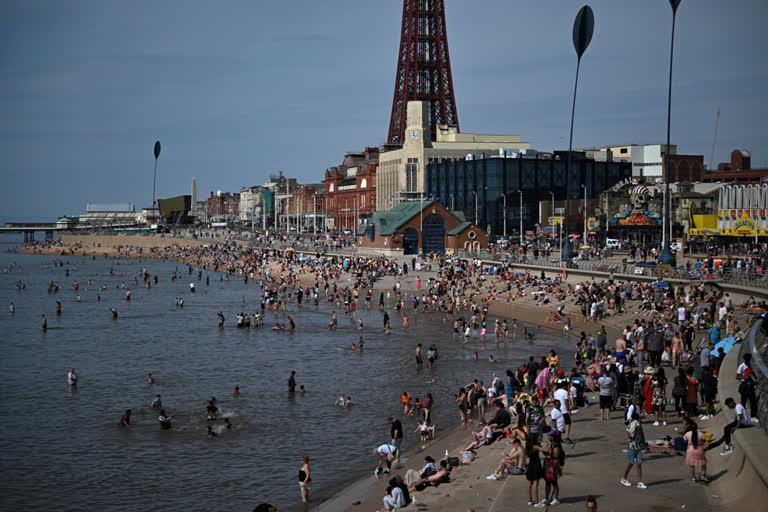Paris(France): Europe's increasingly frequent heatwaves are back under the spotlight over devastating wildfires and with sweltering temperatures forecast to hit record highs in Britain and France this week. In just over two decades, the continent has experienced its five hottest summers since 1500.
- 2022: Double trouble -
A heatwave engulfing western Europe, the second in a month, sparks huge wildfires and threatens to smash records in Britain and France. Fires in France, Greece, Portugal and Spain force thousands of residents and tourists to flee and kill several people, including a Spanish shepherd and a firefighter.
Britain braces for an all-time high of 40 degrees Celsius (104 degrees Fahrenheit) or more. Brittany in France could also register similar temperatures in what would be a regional record. The weather warnings come hot on the heels of a scorching spell in June, where parts of Europe, from Spain to Germany, sizzled at unseasonal highs of between 40C to 43C.
- 2021: Hottest ever -
Last year is Europe's hottest summer on record, according to the European climate change monitoring service Copernicus. Between late July and early August 2021, Greece endures what Prime Minister Kyriakos Mitsotakis calls the country's worst heatwave in over 30 years, with temperatures hitting 45C in some regions.
In Spain, temperatures reach 47C in parts of the south, according to national weather agency AEMET. The heat and drought spark large wildfires along the Mediterranean, from Turkey and Greece to Italy and Spain.
- 2019: Northern Europe swelters -
The summer of 2019 brings two heatwaves, which leave around 2,500 people dead, according to the Centre for Research on the Epidemiology of Disasters of Belgium's Louvain University. In France, temperatures hit a record 46C on June 28 in the southern town of Verargues. Thousands of schools are closed.
On July 24 and 25, northern Europe fries in record heat. Temperatures of 42.6C are recorded at Lingen in northwestern Germany, 41.8C in Begijnendijk in northern Belgium and 38.7C in the eastern English city of Cambridge.
- 2018: Drought drains the Danube -
The second half of July and beginning of August 2018 sees very high temperatures across much of Europe and rivers running dry due to drought. The Danube falls to its lowest level in 100 years in some areas, notably exposing World War II tanks in Serbia that were submerged since the conflict. Portugal and Spain suffer hugely destructive forest fires.
- 2017: Months of mugginess -
Much of Europe, but especially the south, sweats from late June to well into August. Spain set a record of 47.3C on July 13 in the southern town of Montoro. Persistent drought sparks forest fires in Portugal.
- 2015: Back-to-back heatwaves -
It's heatwave after heatwave throughout the summer of 2015 which leaves an estimated 1,700 people dead in France. In Britain, roads melt and trains are delayed in the hottest July on record, with temperatures reaching 36.7C at Heathrow airport.
- 2007: Greek forests ablaze -
Central and southern Europe are parched by drought throughout June and July, provoking a spate of forest fires in Italy, North Macedonia and Serbia. In Hungary, 500 people die as a result of the heat.
- 2003: 70,000 dead -
Britain, France, Italy, Spain and Portugal all experience exceptional heat in the first half of August, with Portugal suffering a record 47.3C at Amareleja in the south. An EU study of 16 nations puts the number of excess deaths across the bloc during the heatwave as high as 70,000, with France and Italy each seeing between 15,000 and 20,000 fatalities, according to various reports since.
In France, most of the victims are elderly people in an episode that traumatises the country and leads to the implementation of new systems of protection during heatwaves. (AFP)



